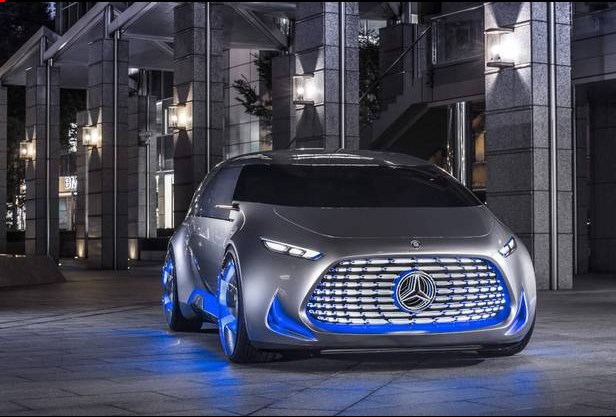The future is bright, most especially for those born in the year 1995 known as 'Generation Z.' The vehicles they will drive around town would be different from what we have now. Take a look at the Vision Tokyo, a fully autonomous car Mercedez-Benz revealed at the 2015 Tokyo Motor show. Its design could only come from the future and its features are mind-blowing.
The Vision Tokyo is a futuristic five-passenger minivan that the German automaker hopes will appeal to millennials in Japan who are after comfort and luxury and wants to do things just by pulling their fingers out while in traffic in the highly populated city .It's a digital, automobile companion that would allow Japanese do things on the go.
It has a couch-like seat similar to those seen on Limousines that would shift anyone in a position of great of comfort. Passengers are always connected with the outside world. There are two holographic displays on the roof and in the centre of the vehicle where passengers can access their favourite apps, visit to blogs like Wearobo, chat with each other, listen to good music etc while the computer in the Vision Tokyo take care of the driving. In fact, If music is playing inside the vehicle the display will, for example, visualise a sound pattern, rather like a sound analyser.
Yes Mercedes-Benz Vision Tokyo minivan look very much like the F 105 luxury in motion research concept that Mercedes introduced at the 2015 Consumer Electronics Show in Las Vegas, earlier this year. There's not much difference here save for the excess lighting and car type.
''The bodyshell of the Vision Tokyo has been designed to allow the crash-protected integration of a fuel cell-powered electric drive system. This is based on the trailblazing F-CELL PLUG-IN HYBRID of the F 015 Luxury in Motion and combines the on-board generation of electricity with a particularly powerful and compact high-voltage battery that can be charged contactlessly via induction. The use of pressure tanks made from CFRP is envisaged for the storage of hydrogen in the concept car. The electric hybrid system has a total range of 980 kilometres, of which some 190 kilometres are courtesy of battery-powered driving and around 790 kilometres on the electricity produced in the fuel cell.''


